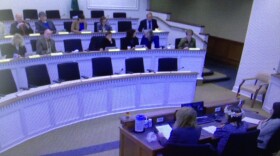The Washington House has given approval to a bill that would provide members of Spokane's Marshallese population with subsidized health care.
One little bit of trivia: today (Thursday) is Remembrance Day in the Republic of the Marshall Islands. That’s an island chain between the Philippines and Japan. It’s of historic strategic importance to the U.S. During the late 1940s and 1950s, the U.S. detonated more than 60 atomic weapons in the atmosphere above those islands and tracked the health effects of the people who lived there. Because of that testing, the U.S. and the Republic of the Marshall Islands have an agreement whereby residents of the Pacific island nation can travel to and live in the States.
During this Washington legislative session we’ve been following one bill of particular interest to the 800 or so Marshallese community members who now live in Spokane. It involves the ability of the poorest members of that community to get subsidized health care through the state. Many move here to get specialized care they can’t get at home.
Marshallese people can buy private insurance through Washington’s health exchange, but many can’t afford it. They used to be eligible for Medicaid, the subsidized health care program for the poor. But the 1986 federal welfare reform law changed that. Advocates for the Marshallese says, that for many, their primary care is not a family doctor, but a hospital emergency room.
Yesterday (Wednesday) the Washington House considered a bill that would restore their access to that subsidized care. It would have the state provide financial help so that low-income Marshallese can get help paying their medical insurance premiums.
Rep. Marcus Riccelli (D-Spokane), one of the co-sponsors of the bill, argued there’s a moral obligation to help the Marshallese.
“We did human testing on these individuals. We took healthy teeth out of these folks to study the impacts of radiation. We took their blood out of their bodies, mixed it with radiation and injected it back to them. So, yes, while this is a federal government responsibility, they are coming up short and we need to do the right thing to provide health care for these folks,” Riccelli said.
Rep. Sharon Santos (D-Seattle) argued that, beyond the moral question, there’s also a public health benefit.
“Our interests are involved here as well," Santos said. "We know that when families and parents don’t have health care benefits for themselves, then they don’t think to bring their children also to a doctor’s and that also puts our children at risk, as we saw in Spokane just a year ago with a mumps outbreak.”
Opponents, such as Rep. Joe Schmick (R-Colfax), say the responsibility is not the state’s. Schmick says he feels for the Marshallese, but he says the bill is too broad. At a time when many Washingtonians are struggling to pay their health care bills, this is too generous.
“Also in this bill, we’re going to pay for the out-of-pocket costs and co-pays for those people who are purchasing on the exchange. So we’re going to pick up the Medicaid and we’re going to pick up the out-of-pocket costs and co-pays. Just so we’re all clear on what we’re voting on," Schmick said. "For those reasons, I’ll be asking for a no vote.”
Schmick proposed an amendment that would require Marshallese residents to have lived here five consecutive years in order to qualify for subsidized care. That failed.
On the full bill, 40 House members joined Schmick in voting no, but 57 voted yes. Because the bill was amended, it may need to go back to the Senate -- which has already approved this bill -- for one final vote. If it receives that, it would go to the governor for his consideration.



